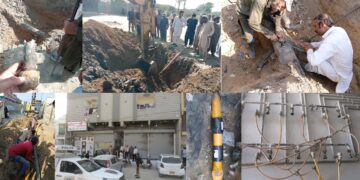Sahiwal, 24th April 2025 – The Trade Development Authority of Pakistan (TDAP) hosted the second event in its seminar series today at the Sahiwal Chamber of Commerce, aimed at revitalizing Pakistan’s maize exports. The seminar attracted a diverse group of maize growers, exporters, and industry stakeholders, focusing on addressing critical challenges such as Khapra beetle infestations and aflatoxin contamination to enhance global market competitiveness.
Moderated by Ms. Hina Tahir, Deputy Director (AFD), TDAP, the event featured a distinguished panel of experts, including representatives from TDAP, the Department of Plant Protection (DPP), the Maize & Millets Research Institute, and trade investment counselors from Vietnam.
Mr. Athar Hussain Khokhar, Director General (AFD), TDAP, Karachi, emphasized the importance of adhering to international phytosanitary standards to regain trust in markets like Vietnam and Malaysia, where non-compliance due to Khapra beetle issues has been a concern. He highlighted a significant 55.71% increase in maize export value to the Philippines and noted that a maize export protocol with China is nearing completion, presenting new opportunities for Pakistani exporters. Dr. Khalid Zafar from DPP provided a detailed overview of phytosanitary certification processes, stressing compliance with the Pakistan Plant Quarantine Rules, 2019, for registered export facilities.
Ms. FaizaShafqat, Trade Investment Counselor (Vietnam), shared insights into Vietnam’s maize import market, which saw 12.52 million tons valued at US$3,041 million in 2024. She outlined steps taken by the Commercial Section in Hanoi, including coordination with Vietnam’s PPD for exporter registration and sending samples to major importers like KhaiAnhBinhThuan and Tan Long Group, to boost Pakistan’s market share.
Mr. Muhammad Saeed, Principal Scientist/Director at the Maize & Millets Research Institute, Sahiwal, presented practical solutions for Khapra beetle control, recommending phosphine fumigation (2-3 tablets/ton) and maintaining maize moisture levels below 13-14%. Dr. Mubarik Ahmed, Consultant (AFD), TDAP, focused on aflatoxin management, advocating for immediate post-harvest drying to 14% moisture and testing at accredited labs like NIBGE, Faisalabad, and HEJ Institute of Chemistry, Karachi. He noted that aflatoxins, produced by Aspergillus fungi, pose significant health risks and require stringent control measures to meet global standards, such as the EU’s 4 ppb limit for processed maize.
Dr. Muhammad Afzal, Entomologist, DPP, analyzed the global maize market, underscoring the need for robust pest management to meet international expectations. Dr. RamzanAsi from Pest Warning & Quality Control of Pesticides, Punjab, addressed systemic issues like inadequate storage infrastructure, proposing hermetic storage and heat treatments to prevent pest infestations.
The seminar emphasized actionable strategies, including the adoption of integrated pest management (IPM), ventilated storage, and avoiding old jute bags to ensure pest-free consignments. Attendees were encouraged to leverage TDAP’s initiatives to enhance maize quality and explore emerging markets like the Philippines and Afghanistan, where export quantities grew by 60.82% and price per ton surged by 125.25%, respectively, in 2024-25.
TDAP announced that the seminar series will conclude in Vehari on 30th April.
To address the recent decline in maize exports, the Trade Development Authority of Pakistan (TDAP) is organizing a series of seminars across Punjab’s major agricultural hubs—Sahiwal, Vehari, and Okara—from 23rd to 30th April 2025. These events aim to tackle critical challenges, which have hindered export potential.



















